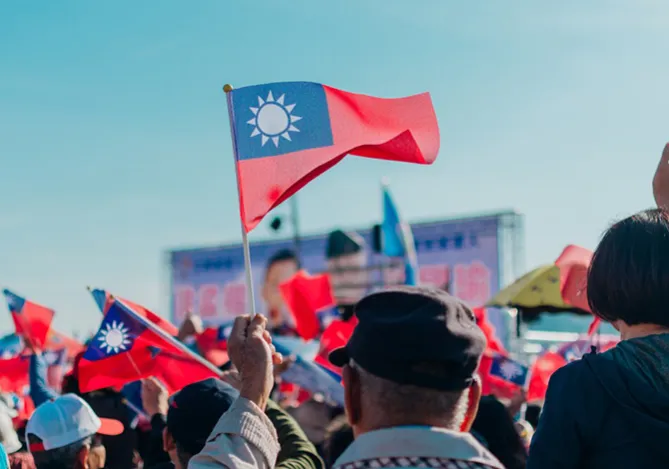-
CENTRES
Progammes & Centres
Location
The world will be closely watching the Taiwan election as it will play a crucial role in shaping the power dynamics in Asia

2024 is a crucial year when more than 50 percent of the world’s population is set to cast their franchise. One election whose result is set to reverberate far beyond its borders in the presidential poll in Taiwan scheduled for 13 January.
The voters in Taiwan perceive it to be a self-governing island; China sees it as a breakaway province that must be reunited with the mainland through peaceful means or war. However, the Communist Party of China’s (CPC) designs on Taiwan are deterred by the fact that the United States (US) is bound by law to protect the island, in the event China tries to annex it. Candidates on the hustings are the ruling Democratic Progressive Party’s (DPP) Lai Ching-te, Hou Yu-ih from the Opposition, Kuomintang (KMT), and Ko Wen-je from Taiwan People’s Party (TPP). An opinion poll conducted between 27-29 December showed that nearly 39.6 percent of the respondents favoured the DPP, the figures for the KMT and TPP were 28.5 percent and 18.9 percent, respectively.
One election whose result is set to reverberate far beyond its borders in the presidential poll in Taiwan scheduled for 13 January.
Given Russia’s invasion of Ukraine, and China’s regular saber-rattling to annex the island that is backed by frequent drills and aerial incursions, the shadow of conflict hovers over the minds of Taiwanese voters. China has said that it views Taiwan’s electoral choices as those between peace and prosperity on one hand, and conflict and economic decline on the other. It has made a pitch to the Taiwanese for opposing “independence-minded” political parties and upholding the ‘1992 Consensus’. The 1992 Consensus refers to a political understanding that the then-ruling KMT in Taiwan and the CPC on the mainland arrived at in which both agreed that only “One China” exists, allowing a modus vivendi that permitted both warring sides to define what the term means, according to their convenience. This arrangement gave latitude to both sides. For China, it became the basis for engagement with estranged compatriots across the straits. But over the time, the KMT tightening embrace of the mainland caused a backlash in Taiwanese civil society that did not see the benefits of the rapprochement with the mainland trickle down. This ferment was one of the reasons for the DPP’s Tsai Ing-wen to come to power. Tsai’s victory in 2016 is an important inflection point since the first woman President of Taiwan refused to abide by the 1992 Consensus, which led to Beijing assessing her as a separatist. Tsai’s landslide victory in 2020 in the aftermath of China's crushing 2019 popular protests led by civil society campaigners in Hong Kong caused alarm in Beijing. Tsai’s pitch to the electorate in Taiwan was that their vote was going to “protect democracy” on the island. Tsai cited the 2019 protests in Hong Kong to reject the ‘One-country-two systems’ framework under which Beijing had pinned hopes on for the eventual merger of Taiwan. In 1997, the United Kingdom (UK) handed over Hong Kong to China on the arrangement that the city-state would be administered under the ‘One-country-two-systems’ framework. Under this arrangement, the city-state would have autonomy and get to maintain its capitalist economic system under the larger canopy of CPC rule, in which the latter would manage its defense and foreign affairs. Beijing went along with the “One-country-two systems” pact since it hoped that this arrangement would lure Taiwan to integrate with to the mainland sometime in the future.
Tsai’s landslide victory in 2020 in the aftermath of China's crushing 2019 popular protests led by civil society campaigners in Hong Kong caused alarm in Beijing.
In recent times, Beijing has upped the ante on the Taiwan issue. Beijing showcased its military might after the then US House Speaker Nancy Pelosi visited Taiwan in August 2022. China perceives deepening of relations between the American and Taiwanese leaderships as a blow to the “One China” notion. Following this, the People’s Liberation Army (PLA) staged military exercises that were tantamount to a partial blockad and flew aircraft with increasing regularity across the median line in the Taiwan Strait, which serves as a de facto demarcation point. In his speech to the National Party Congress, Xi held the prospect of peacefully unifying Taiwan, but also reiterated that China could use force.
In this election too, cross-straits relations are a key issue. Candidate Lai from the DPP, who serves as Taiwan’s Vice President, had earlier publicly spoken about his ambition to make Taiwan independent. On the campaign trail, Lai has described the island as “independent and sovereign” that, in effect, precluded demands for officially declaring independence. The KMT seeks closer economic engagement with China. The TPP portrays the DPP as “pro-conflict” and the KMT as being “obsequious” towards China.
China perceives deepening of relations between the American and Taiwanese leaderships as a blow to the “One China” notion.
Public sentiment is a crucial input in formulating government positions in a democracy. In fact, an opinion poll published in October 2023 by the Taiwan government’s Mainland Affairs Council showed that 85 percent of the respondents were opposed to the ‘One-country-two system’ formula. The survey also stated that nearly 90 percent of those interviewed opposed Beijing’s coercive tactics like PLA aircraft and warships operating around Taiwan. Lastly, nearly 90 percent of respondents backed the government’s efforts to bolster Taiwan’s self-defense capabilities, and safeguard national sovereignty. Another poll by Taiwan’s National University of Chengchi published in 2022 says that 73 percent of the respondents were ready to defend the island in the eventuality of a Chinese assault. All these are pointers to the fact that Taiwan’s society does not favour integration with China.
Thus, the outcome of the 2024 presidential race is set to determine Taiwan’s foreign policy, national security and defence, and cross-straits relations with China. Under the Tsai administration’s New South-bound Policy (NSP), there was a significant uptick in India-Taiwan relations, even though India does not formally recognise Taiwan. The policy seeks to promote exchanges and cooperation in technology, education and culture between Taiwan and western India. Semiconductor firms are looking to invest in India, plans are afoot to establish a Taipei Economic and Cultural Center that function as de facto diplomatic facilities in Mumbai, India’s financial capital. While a DDP victory may further consolidate these initiatives, the prospect of KMT coasting to power may have implications for India. At a time when there is significant tension between India and China and troop build-up along the border, a KMT victory may severely hamper the nascent India-Taiwan friendship. The world will be closely watching the Taiwan election since whoever will be Tsai’s successor has the potential to shape the power dynamics in Asia.
Kalpit A Mankikar is a Fellow with the Strategic Studies Programme at the Observer Research Foundation
The views expressed above belong to the author(s). ORF research and analyses now available on Telegram! Click here to access our curated content — blogs, longforms and interviews.

Kalpit A Mankikar is a Fellow with Strategic Studies programme and is based out of ORFs Delhi centre. His research focusses on China specifically looking ...
Read More +